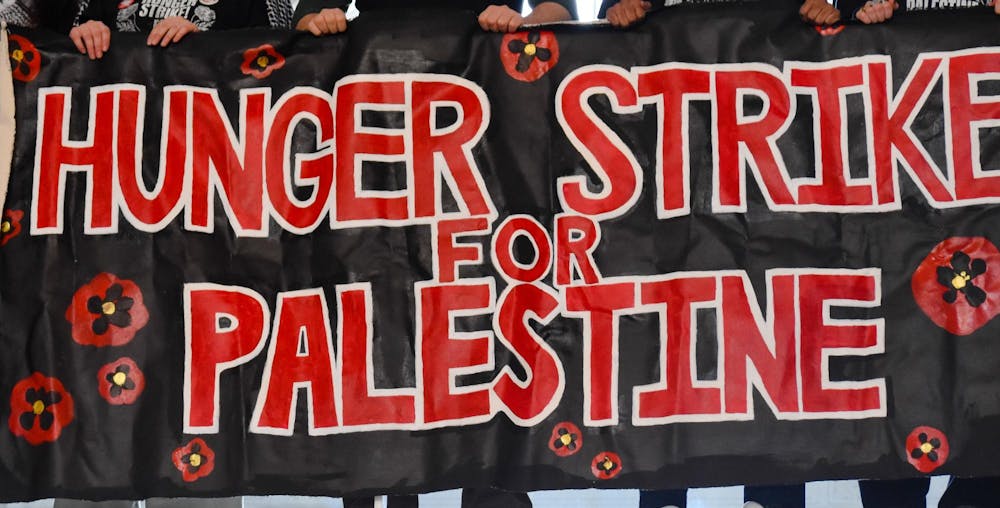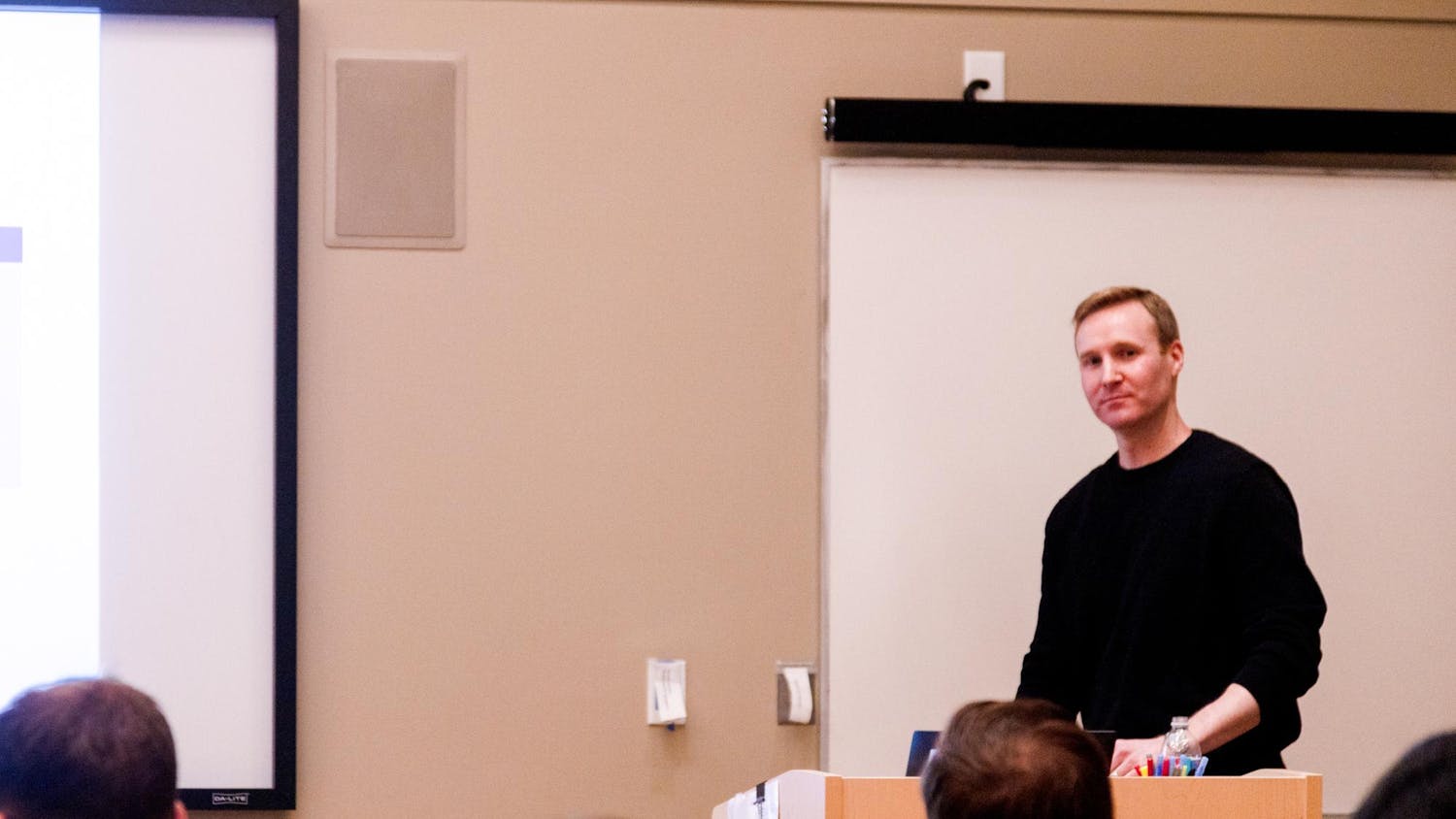Editor’s Note: To help inform The Herald’s ongoing coverage, please fill out this form with your questions about the February hunger strike.
On Friday, 19 students stood behind a hand-painted banner that read “Hunger Strike for Palestine” on the balcony in the Stephen Robert ’62 Campus Center, kicking off an indefinite hunger strike that they say will last until the Brown Corporation “hears and considers a divestment resolution” in its February meeting starting Feb. 8.
The strike, announced earlier that day during a rally attended by around 350 students, calls on the Corporation to hear a resolution mirroring the 2020 report by the University’s Advisory Committee on Corporate Responsibility in Investment Practices, which recommended divestment from “companies which profit from human rights abuses in Palestine.” In a letter to the demonstrators, President Christina Paxson P’19 P’MD’20 declined to meet the students’ demands, instead referring them to the ACCRIP’s successor, the Advisory Committee on University Resources Management.
Amid the buzz of organizers and attendees in the Leung Family Gallery during the following days, The Herald spoke with four strikers about their motivations for joining the hunger strike.
“Growing up in Palestine living under the occupation, I’ve known people who have been on hunger strikes for months out of Israeli prisons in which they were unlawfully detained,” said Aboud, an undergraduate at Brown from Palestine.
The Herald spoke to Aboud on the condition his last name is not published. Aboud cited the potential for political retribution against family members living in Palestine.
While fiddling with the dark-beaded bracelet on his right wrist, Aboud recounted stories from his town, Ramallah, and extended relatives participating in such strikes.
“I’m learning from them (and) learning from a long line of people who have been resistant to occupation,” Aboud added. “While we are not physically occupied here, we’re learning that it is a fight, and you do have to resist to get your voice heard, especially with divestment.”
For him, striking “was an easy decision.”
Aboud grew up in the West Bank, and his parents and siblings still live there. He said that while they are “fine” physically, their lives have changed since October.
When he visited his family during winter break, he observed heavy restrictions on movement and nightly curfews. To travel from city to city, there was often only one road, and those roads had several checkpoints, Aboud recounted.
“Things have gotten worse,” he added. “The occupation has become normalized and legitimized. This was (happening) since before I was born. Palestinians and Arabs have been dehumanized to catastrophic levels.”
Living as a student in America, Aboud said he feels “very helpless and kind of sad.”
“I miss my home more than ever,” he said. “I do know that as long as I am here, I will use my privilege and my studies to speak up and to defend Palestine.”
He said that reactions to his activism — like hateful comments on social media — have changed his perception of Brown “for the worse.”
“There are people who don’t think Palestinians are legitimate people deserving of humanity,” Aboud said. “I’m going against an endless uphill battle because I have to prove my humanity over and over and over again, and every time I decide to speak out, I am criticized.”
For Aboud, the 18 other strikers are “family.”
Throughout the hunger strike, he has returned to the concept of sumud (صمود), or steadfastness. For him, the word describes “how I felt with everyone at Brown coming to support us.”
Kalikoonāmaukūpuna Kalāhiki ’24, draped in a black-and-white keffiyeh, settled into the corner of a quiet room filled with lockers on the balcony level of the Campus Center. Sitting by the window, they pulled a knee close to their chest.
Kalāhiki is Kānaka, or native Hawaiian, and they believe that it is important that the native identity is represented in the strike.
For Kalāhiki, the strike aligned with their belief in “global Indigenous solidarity.”
“As a colonized people existing under a settler colonial state back home, I can deeply empathize with the erasure of nature culture and the displacement of natives,” they said.
Throughout their time at Brown, Kalāhiki has advocated for Indigenous students and communities. They served as co-coordinator of Natives@Brown and organized for Hawaiians at Brown, publicizing the politics, culture and sovereignty of the Hawaiian nation.
Kalāhiki said they originally joined the Students for Justice in Palestine network when planning a teach-in about global indigenous solidarity for native students, noting that their activism draws upon a history of Hawaiian-Palestinian solidarity.
“I know it is my responsibility to stand in this moment because Palestinians have stood steadfast with natives through all our issues from Standing Rock to supporting the American Indian Movement to Mauna Kea,” they said. “It’s very much solidarity.”
Kalāhiki said they view the protestors as “all one organism.”
“We’re all essential to this movement, and it feels very unified,” they said. “We’re all essential organs in this larger being.”
Kalāhiki is starting to feel the impact of not eating. They said they don’t feel as strong as they usually do, and in order to ground themself, they have turned to meditation.
“I’ve been doing prayers in Hawaiian that are calling on my ancestors to stand with me because I know that my body is literally the culmination of their existences, and I am now using my body as a tool for liberation,” they added. “I’m only able to do that because of them.”
Within these moments of reflection, Kalāhiki has considered the privilege of undergoing a hunger strike with the support of a medical team.
“The fact that we have a choice in this is forcing me to really grapple with how so many people in Palestine are literally being starved and not receiving the humanitarian aid that they need,” they added.
Maize Cline ’26 slid slowly down the row of brown lockers upstairs in the Campus Center. With a smile in her eyes, she shared that she opted to take the stairs to reach the room, though she’s been told to preserve her caloric output.
“If I have the physical capability to do this and if I have the mental capability to do this, I have to do this for the people of Palestine and the people of Gaza who are seeing so much violence and destruction every day,” Cline said, describing her motivations to join the hunger strike.
While deliberating joining, she called her parents. Both of them were worried about her health, but they were aware of and supported the power of a hunger strike.
“My mom was like ‘if they can do it, you can do it, too’” Cline recalled. “I sent the ‘I’m in’ text right after that.”
Cline has experience advocating for this cause. In high school, she organized with her Jewish youth group — she proudly shared that her synagogue back home in Berkeley, California, was one of the few that called for a ceasefire.
She largely credited her conviction to her upbringing, reciting a memory of a Yom Kippur service she attended when she was fourteen years old.
She wanted to leave two hours into the service, but her mother said that they needed to stay. Cline recalled that her favorite rabbi used the service as an opportunity to discuss her own experience in the West Bank and the notion that Jewish “existence is tied to Palestinian existence.”
“We as Jews have a responsibility to do something,” Cline said. “We have the autonomy to be able to oppose the state of Israel and be able to say that antisemitism is not the same as anti-Zionism.”
At Brown, she continued and expanded her involvement in this work. She joined J Street upon arriving at Brown, discovering community with other organizers.
After the attacks and aftermath of Oct. 7, Cline felt a need to do more.
Last semester, she participated in programming by the then-new student group Jews For Ceasefire Now. She served as a legal observer for the group’s Nov. 8 sit-in at University Hall.
“It’s become urgent for me,” she added. “I understood that this was a necessary part of my Jewish identity, but it’s become an urgent part of my Jewish identity now. I cannot feel at peace with the way that I practice my Judaism until I feel at peace with the way that the nation of Israel interacts with the world.”
In order to prepare for the intensity and uncertainty of a hunger strike, Cline planned meticulous contingency plans. She feels supported by the medical team and all of the “concentric circles of care” that have shown up for her and the other strikers.
As of now, she said it “feels like Yom Kippur,” but she’s trying to mentally prepare herself for the physical effects to set in.
“I can make it through to the next day,” she said. “And tomorrow, I can make it through to the next one.”
Felora Bellamy ’26 entered the room with their laptop in tow.
Like other strikers, they wore a keffiyeh. Unlike other strikers, they donned a blue sweater with a smiling black cat on the front.
“As a Black person living in this world for 19 years and having my identity politicized in very violent and racist ways, I felt like it was incredibly natural to align my solidarity with Palestinians who have also been given that burden of having their identity politicized,” Bellamy said.
They said that they chose to participate in the hunger strike as a continuation of their work with Brown SJP, adding that “Palestinian liberation is very intertwined with Black liberation.”
Bellamy grew up around many Arab and Muslim families, so they first saw Palestinians “as family friends and loved ones and people I can trust.”
Throughout their continuous learning, they said that they saw parallels between the “militarization” of American police departments and the Israeli military.
Bellamy views the hunger strike as a continuation of past protests on campus with higher stakes, and they hope it will compel the university to take action.
Before they committed to the hunger strike, Bellamy researched historical instances when this method was employed. They referenced those protesting apartheid in South Africa, detainees at Guantanamo Bay and Palestinian prisoners.
“Hunger strikes are usually a point of desperation,” they added. “But for me, I feel highly privileged by my access to medical care and loving people within arm’s reach that I want to use that privilege to center back to the people in Gaza.”
Throughout the strike, they have been “staying in touch with the news,” using this moment as an opportunity to learn and read more about Palestine. Bellamy also referenced the daily programming offered in the Campus Center for students who are not participating in the hunger strike but want to show their solidarity.
“It has actually been so overwhelmingly beautiful to see them show up,” they said. “Knowing that this action is teaching people about Palestine and teaching people (about) the history, the people, the culture — I feel incredibly proud to help do that.”
Dana Richie is a senior staff writer for Arts and Culture and the photo chief. She enjoys using multiple forms of media to capture peoples’ stories and quirks. In her free time, she loves knitting, learning about local history and playing ultimate frisbee.





